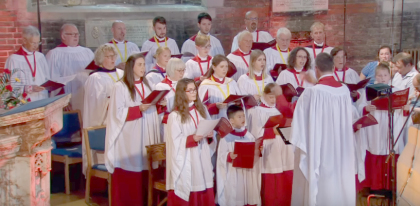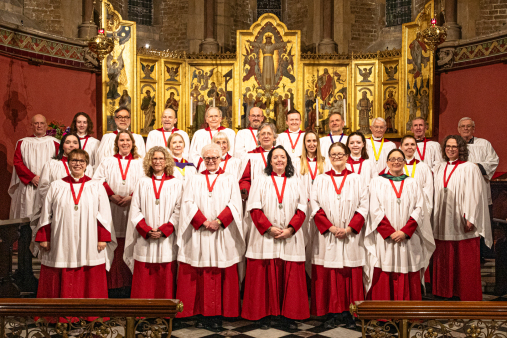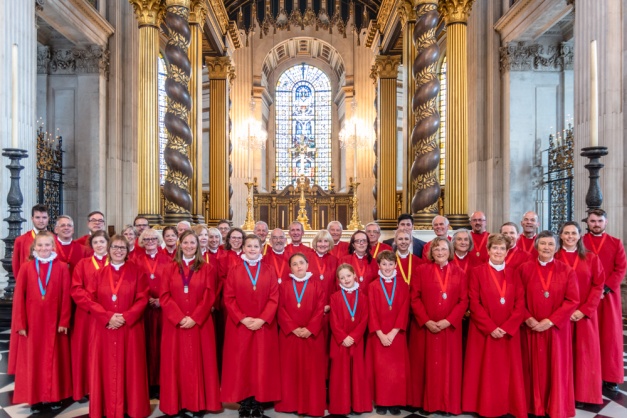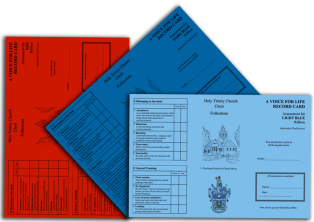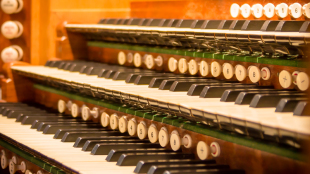Holy Trinity Choir
Testimonials
It was 10-year-old Molly who established a strong role for girls in the choir at Holy Trinity, from a sense that she wanted access to the same experiences of her big brother, Victor. She’d seen him enjoying the experience of singing in a group, in an environment that embraced singing as a completely natural thing to do. There was no laughing or sniggering about the fact that people sang. The choir had an almost magical aura about it, seeming like a club where everyone had a good time. Having not been part of the “in” crowd at school, this was a very inclusive place, a different “in” group which welcomed and nurtured musicianship.
Molly links her involvement in the choir to her musical career. After eight years in our choir, she went on to complete her undergraduate course at Trinity Laban Conservatoire of Music and Dance and gained a Master of Performance degree at the Royal College of Music. She is now working as a freelance solo and orchestral cellist, and in addition to teaching privately in London, she is the lead instrumental teacher at Hartford Music Service. She says that learning the precision of church music was a definite benefit for playing string instruments because it helped to attune her ear to the notes and voice of the instrument.
What choristers enjoy and value:
- It's fun when we work together and help to teach our partners
- We get paid!
- I have lots of fun with the warm-ups, and I've learned how to read music
- Choir is interesting because we learn about different types of music
- I have fun with my friends from school, and I've also made new friends
- I have a passion for music, and choir has helped me to build up my skills.
- It is fun! We go on special outings to amazing places like Westminster Abbey.
- I got to sit where the Queen sat!!
The choir at Holy Trinity has a fine record of achievements and is well known throughout the Canterbury Diocese and beyond.
This reputation has led to them being invited to sing in many places, including two BBC Radio Kent carol services; several concerts with the Folkestone Choral Society and Amberley Orchestra; several services recorded by the BBC Songs of Praise television series, including Remembrance 2010 and Palm Sunday 2011 and numerous cathedral trips.
In order to continue this success, we have to constantly recruit new members and currently have vacancies in most sections of the choir. Girl and boy choristers should be aged between eight and eighteen, although advantageous, previous musical experience is not essential.
Is it fun?
Singing well is good fun and the choir sings a great variety of music to a very high standard. This means that regular training is required and there is plenty to do. The choir is much appreciated by all who hear it.
The choir have been invited to sing the daily services in many cathedrals, usually for a week at a time. These tours usually take place in August and have included weeks in the cathedrals of Winchester, Wells, Christ Church Dublin, Rochester, St Edmundsbury, Guildford, Ely, Bath Abbey, Lincoln, Lichfield, Christ Church Oxford, Gloucester and Chichester, with regular day trips to Canterbury, Westminster Abbey and St. Paul's Cathedral in London.
Faith
Children from the Christian faith, other faiths or no faith are all equally welcome in the choir.
Monthly choir pay
The choir operates within a formal, disciplined environment, and choristers are treated as musicians rather than 'kids'. Whilst in full-time education, 8- 18-year-olds receive a small monthly amount calculated using attendance and the level of proficiency reached. As each level is completed, the rate increases and additional payments are made for weddings and other special services and events
We are always looking for new recruits
It is expected that new junior choristers attend at least one event each week, and this is gradually built up to a fuller commitment until they join the Senior Singers.
Children's Choir: Fridays 6:30-7:30 pm
Senior Singers: Fridays 6:30-8:00 pm
Children's Choir: Sundays 10-11:45 am (Morning service at 10:30
am)
Senior Singers: As above plue
Sundays 5.30 - 7:30 pm (Evening service at 6:30 pm)
Additional services: Include Ash Wednesday, Maundy Thursday, Good Friday,
Ascension Day, Christmas
Eve and Christmas Day.
Holidays: Apart from occasional weddings, we don’t usually sing in August.
Entry to the choir
No prior experience is required, just an enthusiasm for singing, as regular FREE musical training is provided. There is always plenty to do, and the choir is much appreciated by all who hear it. Choristers follow ‘Voice for Life’, a music training programme from the Royal School of Church Music, of which we are a member. All children are supervised by adults with DBS and Safeguarding training.
Organ Scholarship
Worth up to £500 a year; available to 15-18 year olds, with at least grade five piano
Our organ scholarship is an excellent opportunity to gain experience as a part-time assistant organist. Experience in accompanying, conducting, and other aspects of music-making in the church is gained. It can provide opportunities to play for services, work with the choir and gives access to practice on our fine 3 manual Walker instrument. This organ scholarship is funded by the “Friends of the Music”.
Organ scholars will have reached a standard equivalent to at least Grade 5 in piano studies, and an ability to sing would also be helpful, as there would be an expectation to sing when not playing or conducting. We have helped train many professional musicians over the years.
We have many facilities at the church to enable music-making. The choir vestry houses an upright piano and an electronic classical organ that are both available for practising. The church has two grand pianos and a fine three-manual 1966 Walker pipe organ.
Interested?
For further details:
Come and see us at the church - Holy Trinity, Sandgate Road, Folkestone CT20 2HQ
Call us on 01303 901081 or e-mail: dom@trinitybenefice.co.uk
Tim Parsons has been the Director of Music and Organist at Holy Trinity Folkestone since 1993. He also accompanies Folkestone Choral Society and The Shepway Singers.


